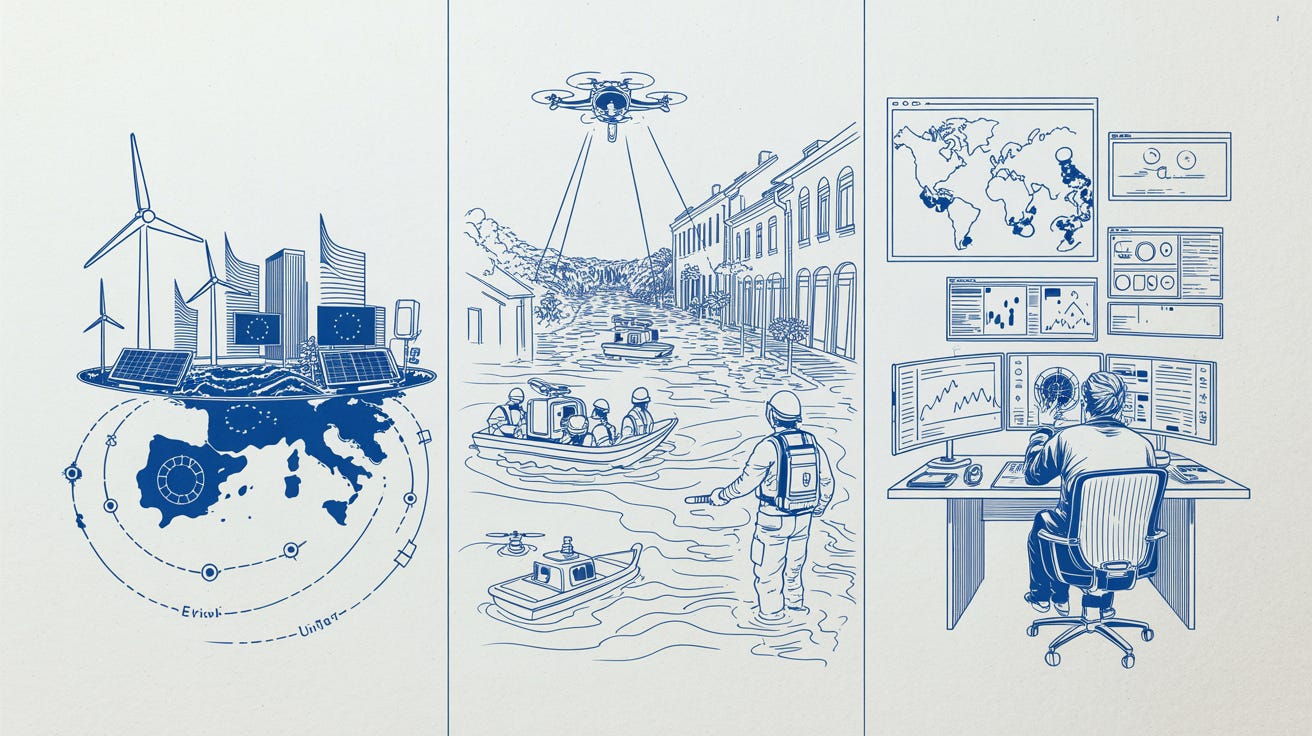The Roundup: All The Important Stories You Missed (Oct 26, 2025)
This week: Europe reaches 2040 climate truce, rare earths are still hot, disaster business is booming and the rise of the Icelandic mosquito + shoutout to Critical Minerals Journal
Happy Sunday!
Welcome to another edition of the Time Machine, the roundup of weekly stories too important to miss.
This edition will have less story-by-story recap, and more of a theme-driven roundup. Hope you like it! (you can always reach out to complain 🤷♂️)
In Short
Big: EU & Emissions, UK climate indecision, rare earth deals galore
Small: Disaster business, NATO goes green (?), Icelandic mosquitos
Cool: Gemini Climate Warrior
Spotlight: Critical Minerals Journal
TL;DR
The Bigger Things:
Europe advances its 2040 emissions plan (but doesn’t actually solve anything)
The UK can’t seem to make up its mind on climate (is it fish vs. chips?)
Rare Earths are still on fire (get them while they’re hot!)
The Smaller Things:
The Disaster-Industrial-Complex is outperforming the S&P500 (I didn’t know it was a thing)
NATO faces call to go green by a bunch of soft… ex-generals? (I dare you to send that letter to Trump)
Rise of the Icelandic Mosquito (seriously is nowhere safe?)
The Cooler Things:
Google’s Climate Warrior Chatbot
Creator Spotlight:
Critical Minerals Journal (the best place to get your minerals fix!)
In Case You Missed It…
Here’s what I thought about the events of last week, if you missed it:
The Bigger Things
The biggest stories you probably missed:
Europe advances its 2040 emissions plan
What Happened? Remember the EU’s ambitious emissions target plan? Yeah, that one:
This week, EU leaders reached an agreement to move forward with the plan (dubbed a “truce”), but opted to leave the technical details to a November ministerial meeting, which won’t be any easier.
The reason is that EU leaders did not actually manage to solve any outstanding issue. The EU added a ‘revision clause’ allowing future weakening of the measure in case the macro environment worsens.
At the same time, US and Qatar sent a letter to Europe, “suggesting” that the continent water down its Corporate Sustainability Due Diligence Directive. Europe doesn’t seem to cave in.
Why Care? 🤷♂️ Because the EU is at a crossroads, facing both internal and external pressures to wind down climate action. It won’t be easy for the continent with member states pushing in different directions, challenging financial markets and one Donald Trump.
Of course, Europe did what it does best: kicked the can down the road..
The UK Can’t Seem to Make Up Its Mind on Climate
What Happened? The UK’s climate landscape seems like a hot, contradictory mess these days.
Keir Starmer’s ambitious 2030 clean energy target (Plan for Change) appears to be quietly abandoned amid soaring energy bills and the surge of the Reform UK party.
Meanwhile, Energy Secretary Ed Miliband promises 400,000 new clean energy jobs by 2030, and the Green Party is reporting record growth under Zach Polanski’s leadership.
Why Care? 🤷♂️ Because the UK is not alone in this confusing landscape. Many countries, serve as a battleground for pro- and anti-climate movements, policies and actions. This is a result of growing global challenges that include rising prices, record energy consumption, and rising geopolitical tensions.
The UK has traditionally been an important signal for other countries and its internal battles will likely influence other European countries.
Rare Earth Elements are Still Hot
What Happened? Last week, following China’s export controls, nobody could get enough of Rare Earth Elements (REEs). Suddenly, everyone’s an expert. Yes that includes me as well.
If you thought the excitement would pass, think again. REEs are still very hot, and countries around the world are using China’s self-inflicted wound to drive up their REE capacity in response.
Just this week, we saw the US sign a landmark framework with Australia that supports a pipeline of projects worth $8.5B to counter China’s dominance, sending Australian firms skyrocketing (such as Lynas and Arafura). In the UK, Pesana moved to create a Mine-to-Magnet supply chain in the US, and US firm Aclara moved to build a REE separation plant in Louisiana.
Why Care? 🤷♂️ Because despite some skepticism, the REE train is still very much on the move. REEs are heavily consequential for the world’s economy, and even if the US and China reach a deal, I personally think that there is little reason to believe Western countries, alarmed by China’s moves, will let this one go. Whether they succeed is a totally different matter.
The Smaller Things
The stories you should have on your radar:
The Disaster-Industrial-Complex is outperforming the S&P500
What Happened: Disaster recovery is big business, I guess. Weather-related disasters are becoming more frequent and violent, causing unprecedented damages. Just in the first half of 2025, disasters cost the US more than $100B.
As costs skyrocket, disaster recovery companies are seeing their businesses boom, with companies specializing in the cleanup, repair and recovery are outperforming the S&P500. These companies include engineering firms, hardware stores and even insurance companies.
Why Care? 🤷♂️ Because this is an overlooked, yet growing business that is worth paying attention to, especially as FEMA is attempting to shift responsibility to the local level. This is the Reconfiguration in all of its glory: A new world that is forming in front of us that is made of an odd and macabre marriage between disaster and recovery, creating a perverse (yet important) market.
NATO faces calls to go green by a bunch of soft… ex-generals?
What Happened: Before calling climate advocates soft, remember: sometimes, they’re ex-generals. A bunch of them sent a letter to NATO, asking the organization to go green and switch to renewables. Why? to reduce reliance on Russia, of course. The generals argue that renewables are harder to destroy (seen in Ukraine) and cite the recent target raise as an opportunity to do so.
Why Care? 🤷♂️ Because we see once again that climate and security are inextricably linked, and even top NATO generals can see it. Given the US Administration’s stance towards climate change, it won’t be easy for NATO to heed the call.
We are likely to see the organization continue to debate the two ends of the spectrum, which will likely lead to confusing policy that will continue to be tested by a more extreme climate. I wrote about it a few months ago:
Still, debates notwithstanding, climate change doesn’t care if we believe in it, and it also doesn’t care about if we have other worries as well, like Russia.
Rise of the Icelandic Mosquito
What Happened: Today, in our weekly edition of “You’ve gotta be kidding me”, we visit Iceland, where mosquitos were discovered recently. If you’re wondering why is that surprising, it is because Iceland doesn’t have mosquitos. Not. A. Single. One.
Thanks to its extreme cold, Iceland was one of the only two places in the world without mosquitos. Until recently, where a few of them were discovered on the island. Researchers are not sure if climate change is the culprit, even though Iceland is suffering much higher temperatures in recent years.
Why Care? 🤷♂️Because there goes my Mosquito getaway. While it’s not sure that climate change is to blame this time, if temperatures keep rising, they will make Iceland a ripe destination for the buzzing creatures. This is a reminder of the world we’re creating - one with nowhere to hide from Mosquitos. Oh well, I better bring my spray next time I visit.🦟
The Cooler Things
Honestly it’s just too cool to miss out on:
Google Earth’s New Chatbot is a Climate Warrior
Google is always pushing the envelope on cool things. You’re probably thinking NanoBanana and Genie, but I’m actually talking about its new climate fighting chatbot.
Google has launched an upgraded version of Earth AI, integrating its Gemini chatbot to help users explore and understand climate risks in their region.
With the new geospatial AI features, users can ask natural language questions, like “find algae blooms” or “show flood risks” and access satellite data, environmental trends, and predictive insights. The new chatbot combines weather, population, and imagery datasets to not only map existing changes, but predict future disasters and highlight which communities are most vulnerable.
But… it costs money, and not a little. If you have extra $75 to chat with Google on climate, well, then you’re a better person than me 🫡
Still, this is a helpful and cool move by Google, so well done!
The Reconfiguration doesn’t have to be depressing. It can be very cool!
Creator Shoutout
Every week I’m going to highlight a writer/creator I am inspired by.
This week’s shoutout goes to:
Critical Minerals Journal
CMJ was on top of critical minerals and rare earths before it was cool!
This publication is my go-to source to better understand what’s happening with the minerals and materials that underpin our global economy. Whether you’re looking for the headlines and the TL;DR, or looking to dive deeper into the dynamics of the industry, CMJ is a great source to follow.
I personally read this publication to inform my own (emerging) writing on the topic.
Check it out here!
Thanks for reading! If you enjoyed this edition, don’t forget to subscribe or share your thoughts. 🔽
See you next week!









